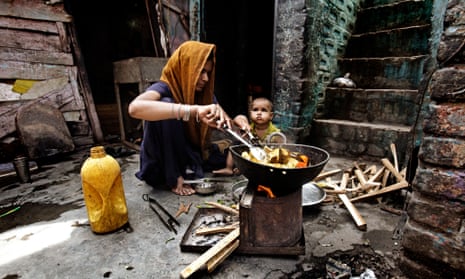Steven is in the vanguard of the gender equality revolution. He is a full-time caregiver of his two young children. He feeds them, takes them for check-ups, and wakes late at night when they cry in their sleep.
But Steven is not the hip father with the designer stroller whose wife is a high-powered CEO in London or San Francisco. He lives in a small town in Sri Lanka and his wife has migrated for work to the Gulf states. He says: “Other men whose wives work abroad left their children with relatives … But I felt I had to look after them.”
Steven is also in the vanguard of a revolution about what it means to be a man. His daily chores and choices – like millions of men around the world – throw out our old ideas of what women and men are supposed to be and do. We know from research (and he knows from experience) that a father can do all the caregiving tasks that a mother does, except breastfeeding of course.
It’s about time that we finished the gender equality revolution. It’s time we finished the arduous and heroic work started by the feminist movement of transforming the lives of women and men. Yes, it’s about achieving full equality, about ending male violence against women, ensuring women’s reproductive rights, and promoting women’s leadership.
But it’s also about time. Meaning, who does the daily work in our homes that makes our lives possible; who wakes up early, does the laundry, cares for ageing family members, cooks, and cleans; who works outside the home; and how we negotiate these things at the kitchen table every night.
Years ago, we received incredulous smirks and pained smiles when we suggested in UN meetings that gender equality would only be achieved when men did half of the care work. Some of the women’s rights advocates in the room, who themselves had defied norms to achieve leadership positions, said things like: “Men in my country will never do that.” Certainly we have a long way to go. In middle- and upper-income countries, women still do two to three times more care work than men. In other countries, it is up to 10 times the amount.
But nearly everywhere we look, the demand by women for men to do more is being embraced by a growing percentage of men. A rapidly increasingly number of fathers no longer see themselves as “helping out” but as being equal caregivers. This is most advanced in the global north (with the Nordic countries leading the way) but we’re seeing this trend around the world. Steven is not alone.
This incipient global transformation of fatherhood is part of a redefinition of what it means to be men. This is not something that men are only doing for their partners. This is making men’s lives better. Studies find that fathers who report close, non-violent connections with their children have fewer mental or physical health problems, are less likely to abuse drugs, are more productive at work, and report being happier. Household surveys we’ve carried out from India to Croatia report, not surprisingly, that the female partners of these men are happier with their husbands, including being more sexually satisfied.
Research also shows that greater involvement of loving, caring, non-violent fathers is good for children: daughters aspire to less traditional and potentially higher-paying jobs and boys do better in school. A nationwide study in Norway found that such households had a third the level of household violence than homes where women did the lion’s share of care work.
So what’s the hold up? Thousands of years of history, outdated ideas, and social and economic structures get in the way. What then do we need to do to push forward this transformation of fatherhood and full equality in the home?
This week we are launching the first State of the World’s Fathers. It’s part of an international campaign on involved fatherhood, called MenCare. Drawing on a growing body of research, the report provides good answers to that very question.
As the Nordic countries have shown, nothing has worked as much to move the needle as equality in parental leave. It needs to be paid leave and non-transferable between men and women so men will use it. But parents can’t do it alone. Full equality for women in the workplace and for all working parents requires subsidised, affordable childcare. At the same time, unless our workplaces become more flexible and responsive to the needs of parents, families will usually revert to the default position of mothers taking time off to be the exclusive caregiver.
Involvement by men also requires an early start. UK studies show that men involved in pre-natal visits and parenting classes stay more involved and set patterns of equality that their children follow. We also need to support parents to raise their children without violence. Parents need support to learn positive disciplinary approaches. Finally, we need to encourage more men to work in childcare, primary school teaching, and other caregiving professions to change the notion that caregiving is not something feminine, but simply human.
We should strive for nothing less then men doing 50% of the care work on the planet. No more smirks. No more incredulity. Men can do it.
The State of the World’s Fathers Report published by the MenCare campaign is out now: www.sowf.men-care.org
Gary Barker is founder and international director of Promundo and co-founder of MenCare and MenEngage. Michael Kaufman is Senior Fellow at Promundo and co-founder of the White Ribbon Campaign, the international effort engaging men to end violence against women.
Join our community of development professionals and humanitarians. Follow@GuardianGDP on Twitter.
